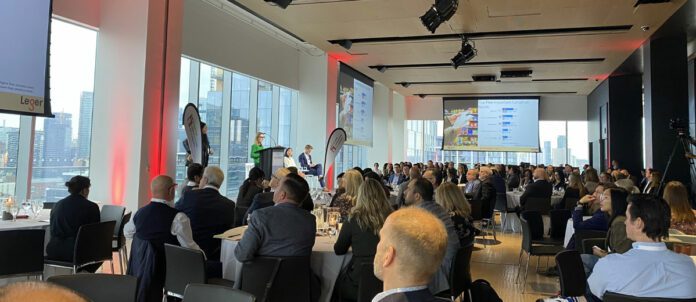TORONTO — Last week, more than 100 industry stakeholders gathered at the Globe and Mail Centre in Toronto for the Coffee Association of Canada’s (CAC) annual conference. The conference, themed Connect, provided attendees with trends, insights and data for the advancement and enjoyment of coffee in Canada.
“The [CAC’s] core purpose is to support the Canadian coffee industry through advocacy, education and connection. Our vision is to be the industry expert and advocate for the Canadian coffee community, ensuring a prosperous future for the coffee industry overall,” said Robert Carter, president of CAC, as the event began. “As part of our growth over the last couple of years, we’ve focused on increasing our membership. We’re excited to welcome a number of new members over the last year. Our membership is at the highest it’s ever been in the association’s history.”
The first panel of the day, Seize the Data, featured Lisa Covens, senior VP at Leger; Kathy Perrotta, VP of Strategy & Market Understanding at Ipsos; Nick Gibson, who is part of the SMB (Small/Medium Business) team at NielsenIQ Canada; and Cheryl Hung, VP of Research at Dig Insights. Each panellist presented their company’s data to cover a wide range of topics, from macro-economic dynamics in Canada to coffee-consumption trends.
Covens began by sharing results from Leger’s State of the Canadian Economy study. The most recent data was collected from more than 2,000 Canadians at the end of September. According to the study, the top-five issues facing Canadians include inflation, housing affordability, healthcare, rising interest rates and climate change. She also said Canadians’ perception of the state of the economy has been the worst the company has seen since it started tracking the data in February 2020. Lastly, two thirds of respondents believed that Canada is in an economic recession.
Then, Perrotta said, “In tandem with inflation pressures, there are also a number of forces that continue to influence Canadians coffee-consumption habits,” adding Ipsos tracks the behaviour of more than 15,000 coffee-drinking Canadians every year. Her presentation focused on four population changes and the opportunity it opens up for the coffee industry.
Overall, “[Ipsos recorded] 36.5 million people and 17 billion servings of hot brewed coffee in 2016,” said Perrotta. “Fast forward to 2023, though per capita cup consumption of brewed coffee has softened, servings are up five per cent by sheer population change. Looking ahead to 2030, there’s an additional growth of four per cent in hot brewed coffee servings.”
Household sizes are shrinking, “but coffee consumption is up five per cent in one- to two-person households in 2023 versus 2020. It’s up among millennials in one- to two-person households by 33 per cent and it’s up among multi-cultural Canadians in one- to two-person households by 38 per cent,” continued Perrotta. “Format is an important dynamic based on household size, with 34 per cent of all servings pre-ground, 25 per cent pods, 21 per cent beans and 20 per cent instant.”
Next, the CEO Panel, moderated by Richard Southern, news reporter at CityNews 680, featured Thomas Wong, co-founder & president of Kevito Group; Lisa Richardson, EVP & COO at Canterbury Coffee; and Matt Johnston, co-founder & CEO of Collective Arts Brewery. Together, the panellists discussed technology advancements, labour shortages and beverage innovations.
“The biggest technology innovation in the coffee industry is single-serve,” said Richardson. “To layer on, Canterbury’s business has primarily been based on direct store delivery (DSD) to foodservice operators for 42 years. From a technical standpoint, we’ve seen how the way people brew coffee has changed as equipment suppliers have moved from traditional glass pots to thermoses to single touch, bean-to-cup methods. From a manufacturing standpoint, technology is going to have to be an assistant due to labour pressures.”
With regard to labour shortages, Johnston said, “The pandemic had a big impact on commuting for some employees. They’re liking the flexibility and work-life balance, so trying to get everyone back to the office for us, which is important to build collaboration, has become that much more challenging.”
“Employers need to have value proposition,” said Richardson. “Salaries have not kept up with inflation, so we have to be flexible. We’re continuously working through it so we can do better for our employees.”
Southern shifted the conversation to beverage innovations, noting that Starbucks in the U.S. sells more cold beverages than hot beverages. Then, Wong spoke about the innovations in bubble tea. “In their respective categories, everyone is seeing this shift toward cold beverages and new types of beverages that haven’t been part of the culture of brewed coffee historically,” he said. “I’ve seen a lot of traditional ingredients that you might not associate with being in a beverage are now going into beverages. In terms of coffee, a big one in Asia right now is avocado coffee.”
The third panel, Seize the Data #2, featured presentations from Vanessa Toperczer, senior VP at IMI International; Rick Brown, president, Foodservice, Fashion & Beauty at Circana; and Cheryl Hung, VP of Research at Dig Insights.
Toperczer kicked off the panel with a discussion about what consumers are thinking about, how they’re feeling and what issues are close to Canadians’ hearts. “The reason for this is to be able to know how to best connect with your brand, you need to know what your consumers care about,” she said.
Then, Brown talked about foodservice coffee trends. “Despite all the doom and gloom, there are things to celebrate,” he said. “Foodservice is seeing a 12-per-cent increase in dollars year-to-date as of August. Looking at the September numbers, we’re still up 12 per cent year-to-date. In terms of traffic, we’re well above historical norms,” noting a seven-per-cent growth in traffic.
In terms of coffee servings at commercial and non-commercial foodservice, Brown said there are three takeaways. “We haven’t reached pre-pandemic levels, and it might take us a little while to get there as consumption per capita at foodservice is on the decline. Coffee had already started to decline at foodservice prior to the pandemic, and that’s largely due to the generational trends with Boomers retiring and younger workers replacing them as they have a more diverse portfolio of beverages they choose from, which has a negative impact on coffee consumption. Lastly, consumers invested in their expensive coffee machines and working from home became more popular so these changes have been pretty sticky as they affect foodservice.”
Brown also noted a shift away from traditional brewed coffee and toward speciality coffee beverages, especially iced coffee. However, Boomers largely still prefer brewed coffee while younger generations opt for speciality beverages.
Hung wrapped up the panel by stating that while millennials are feeling a financial pinch, 60 per cent are willing to spend money on better quality coffee and are willing to pay more for brands that are environmentally-friendly.
Dr. Sylvain Charlebois from the Agri-Food Analytics Lab at Dalhousie University delivered the final presentation of the morning, which forecasted the future.
“Climate change is the number-1 threat for the agri-food sector and the carbon tax is one mechanism that we’re using under the current regime, which is being criticized for several reasons,” he said. “But, consumers need to stop blaming carbon tax for increased food prices because there a lot of things that impact food prices, such as weather and consumer behaviour. The focus should be on competitiveness. We need to know what we’re going into and how it’ll affect the competitiveness of our industry.”
Overall, Sylvain said things will be more manageable for consumers in 2024. “Whatever your companies are doing around sustainability, keep doing it,” he said. “There’s something about coffee that’s quite powerful. No matter what happens to the market, coffee still has a bright future.”
For additional coverage of the CAC Annual Conference, check out the November 21 edition of Hospitality Headlines


















